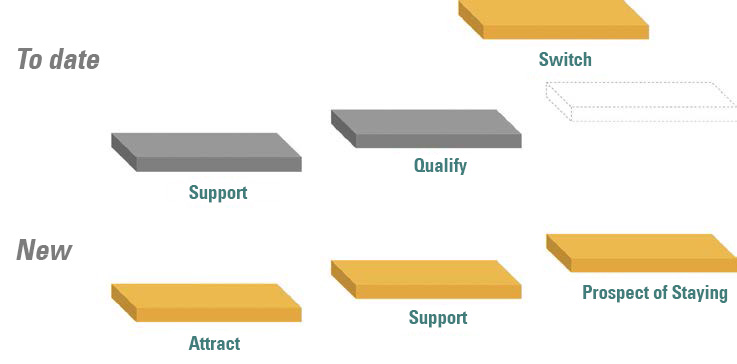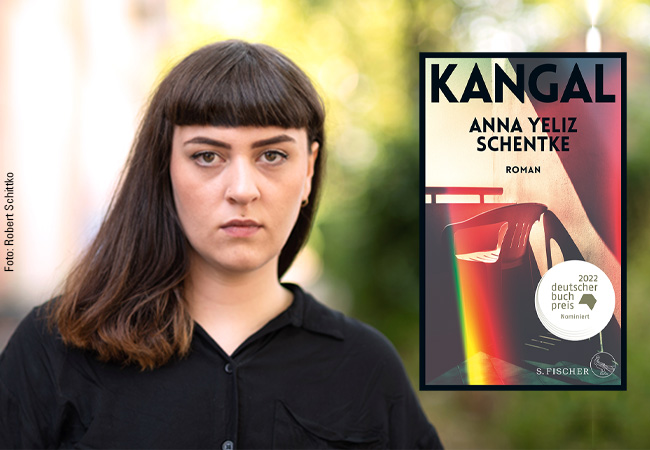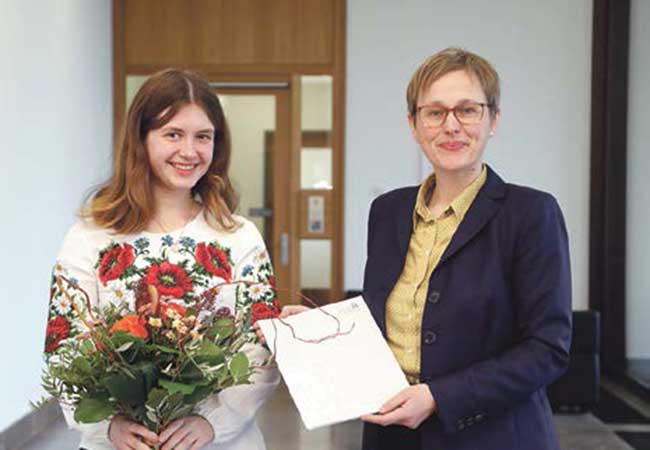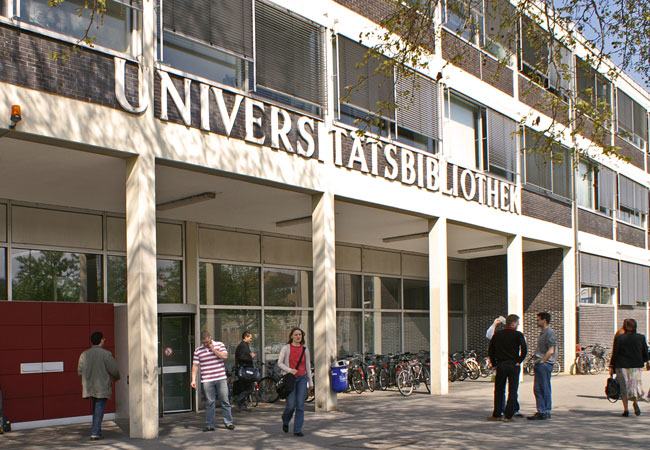There can be no doubt about the fact that the tenure-track professorship has considerable potential. But how could it be better embedded within Germany’s academic system, and how might a further development of staff structures in this system look like? Together, Dr. Nicole Thaller and her colleagues from the “Tenure-Track Network” have given this matter some thought, and published their ideas in a highly acclaimed article in DUZ, a German-language magazine for science and society.
UniReport: Dr. Thaller, what experiences from the Tenure-Track Network did you incorporate in your DUZ article?
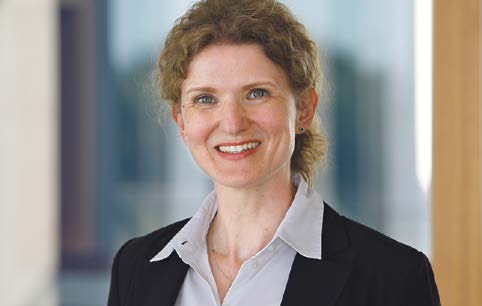
thaller@pvw.uni-frankfurt.de
Photo: Uwe Dettmar
Nicole Thaller: The network was born out of the initiative of Jena, Frankfurt, Freiburg, Mainz and Hanover universities and the German U15 [a network representing 15 leading German research-intensive universities], which jointly hosted the tenure-track conference “The Tenure-Track Professorship – New Momentum for Germany’s Academic System” in Berlin in September 2020. Within the network, working groups deal with different questions and topics: alongside Working Group 3, “The International Appeal of the Tenure-Track Professorship”, which I’m coordinating, there is also Working Group 1 “Potential Analysis, Performance Indicators and Quality Assurance”, Working Group 2 “Support and Further Qualification of Tenure-Track Professors” and Working Group 4 “Further Development of Academic Staff Structures and Career Perspectives in Academia beyond the Professorship”. The network currently has around 100 members at about 40 universities, all of whom have a background in science management and specialist expertise in the topics covered by the network. We exchange views and ideas on a regular basis and network at the annual meeting. We develop content together at our meetings, which is then made accessible to the university public: In addition to the DUZ article, I would also like to mention the article “Internationale Attraktivität der deutschen Tenure-Track-Professur – Geeignetes Rekrutierungstool für internationale Bewerber*innen?“ [The International Appeal of the German Tenure-Track Professorship – A Suitable Recruitment Tool for International Applicants?], published in the issue “Tenure-Track-Professur und akademische Karrierewege” [The Tenure-Track Professorship and Academic Career Paths] of the journal Personal- und Organisationsentwicklung in Einrichtungen in Lehre und Forschung.
(Open Access here.)
Why, in fact, does moving to another university cause career problems? After obtaining a tenured professorship, would the previous tenure-track professor still be able to move?
A look at the international academic landscape shows that the long phase of uncertainty in an academic career, when compared with other countries, at the very least merits an explanation. With Germany competing for the best academic minds, offering interesting prospects at an earlier career stage could increase its appeal. The introduction and implementation of the tenure-track professorship is linked to goals that were formulated, among others, in the “Bund-Länder-Programm zur Förderung des wissenschaftlichen Nachwuchses” [Joint Federal Government – Federal States Funding Program for Junior Academics], including more reliable prospects, equal opportunities and internationally attractive career paths. However, we’re currently observing from external calls that other universities are also very interested in our appointed tenure-track professors – especially our female professors. It could be that what we’re seeing here is an interesting development in the envisaged cultural change, linked to the signal effect of a professorship.
The tight timeframe of the tenure-track professorship appears to be a problem: What could be done in this regard?
The potential for configuration lies above all in legal and organizational aspects. At the federal state level, higher education legislation should create the necessary framework, by taking care responsibilities into account for example. The universities can then do the finetuning, such as allowing extensions to tenure-track professorships, as the science and research funding organizations did in the context of the coronavirus pandemic.
What resources-related problems exist?
If it’s not the tenure-track professorship with a reduced teaching load that is used to calculate teaching capacities but instead the actual professorship with a full teaching load, this can have a major impact on the resources of the faculty in question. For the cultural change to succeed, this difference in teaching requirements would have to be offset in other ways. The adjustment of the Capacity Guidelines envisaged in the Coalition Agreement of the Federal Government in 2021 might offer some relief and at the same time constitutes an important building block for the successful implementation of tenure track, alongside legislative adjustments at the federal state level. In addition, it remains unclear how willing universities will be to invest in costly lab modifications and equipment, for example, when there is the possibility of a potentially negative tenure-track evaluation. Beyond questions of endowment, a discourse within higher education policy on time resources and better access to external funding would also be desirable. Adjustments in the funding conditions of external funding programs would be conducive to this, including opening up the Federal Government’s “Women Professors Program” or establishing special program lines for tenure-track professorships.
In your DUZ article, you argue that introducing new committees in the context of tenure-track professorships is a challenge.
New committees could be seen as additional work, as an increased administrative burden. They could trigger friction in internalized ways of thinking that make adjustment processes necessary. Established quality standards might have to be supplemented or even replaced by new ones, or ones that need to be negotiated afresh. Cultural change also means being amenable to changes in general.
You also speak of “subject-specific challenges”.
I mean, for example, that disciplines in which “habilitation”, the postdoctoral teaching qualification, plays a key role for appointability might consider the tenure-track professorship less suitable. At the same time, the tenure-track professorship also offers many creative opportunities, such as developing new fields of research or expanding high-potential research areas.
Negative evaluation decisions are difficult, too.
If the evaluators of a tenure-track professorship believe it’s questionable whether Germany’s academic system already offers sufficient career alternatives in the event of a negative evaluation, they might factor this into their decisions.
How would you describe the difference to a junior professorship?
The possibility of adding “tenure track” when advertising professorships was created with the introduction of the junior professorship in 2002, as part of the Fifth Amendment to the Framework Act for Higher Education. In practice, however, it was not much used. The junior professorship was mostly implemented as a professorship initially limited to three years, then extended by a further three years after successful interim evaluation – and thus limited to a total of six years. This meant that, as implemented in practice, the junior professorship did not solve the fundamental challenge of academic training on the one hand and a simultaneous uncertainty about your further academic career on the other.
The term “tenure track”, borrowed from the US-American academic system, means “path to lifelong appointment” to a professorship and thus aims to demonstrate a more reliable perspective that depends solely on a person’s individual academic performance. While many federal states continue to use the term “junior professorship” for tenure-track professorships, too, by using the term “Qualification Professorship with Development Commitment” – as employed in the Hessian Higher Education Act – Hesse explains what it’s essentially about.
How could the discussion be continued in a fruitful way? What framework conditions are required?
In particular, we need structural adjustments, for example in capacity legislation, further adjustments in the legal framework, greater consideration of the tenure-track professorship in the programs of the science and research funding organizations, and an upgrading and continuation of the tenure-track program as announced in the Coalition Agreement of the Federal Government in 2021.
You are the operational manager for the Wisna project. What is it about?
To consolidate the tenure-track system over the longer term and implement it across the board, Germany’s joint federal and state program supporting early-career researchers [Bund-Länder-Programm zur Förderung des wissenschaftlichen Nachwuchses, Wisna] was launched in 2016. The program aims to create more transparent, more reliable and more family-friendly career paths and to enhance the international appeal of Germany’s academic system. With a volume of €1bn for 1,000 funded tenure-track professorships, the program aims to drive cultural and structural change at universities and to make academic staff structures more diversified and permeable.
Interviewer: Dirk Frank
The article (in German) “Kulturwandel: Transformation gestalten” [Cultural Change: Shaping Transformation] was published in Issue 10/2022, 2 December 2022, of DUZ WISSENSCHAFT & MANAGEMENT, and can be downloaded here.


